Contents
Typographic Poster
Brooklyn Historical Society, DUMBO
Target: Local New Yorker’s
Goal: Increase attendance at programs and exhibits
Develop a poster for BHS, It should consist of typography as the main design element.
Do research. Look at course Pinterest boards / reference links
Poster design will be discussed. A successful poster communicates its message directly and powerfully through visual impact, an intriguing message, typography, color, graphic image and text combinations.
Poster Design
A successful poster communicates its message directly and powerfully through visual impact, an intriguing message, typography, color, graphic image and text combinations.
Posters that get lost in the crowd or fail to communicate their message are usually ones that try to say too much, do not have at least one eye-grabbing feature or look too much like everything else.
Project Site
Initial Research
Part A. Poster Critique
1. Select one poster from:
TYPOG Typography Poster:
or Typographicposters.com
2. Draft short review
Post it to the course site in a new post.
3. Create OpenLab post
Name layout file: “lastname firstname P2a”
Category Project 2
Insert a single image poster saved as a .jpg named
“lastname_firstname_p2a.jpg”
Start with the principles of typography, design and composition.
Second think about the poster’s purpose, goals, and audience. Is the message clear.
Third think of design as poster, is it effective, is will it stop the viewer?
Elements: Line, shape, form, color, space, texture
Principles: Identify any uses of scale, contrast, repetition or pattern
Contrast: Typography lives off contrast. It can be achieved in many different ways. Using contrary fonts or colors. Does it lack contrast?
Grid: Identify if there is any use of grid
Hierarchy: Is the emphasize on the right words or letters?
Does main type form an “image” or design element, only on second glance you can see text?
Legibility: Typography helps convey message.
Does the typography stands on its own, as the main design element? Is the type legible
Use of Fonts: Does font used fit concept or what is said?
Part B Initial Research
Do research. Look at course Pinterest boards /or museum site. Select one piece of communications designed for museum Insert a jpg into post on OpenLab you created for Part 1
Reference
Rocco Picatello FIT Poster Series
Brooklyn Historical Society
Pinterest Brooklyn Historical Society
Design Process
– You should try and sketch ideas
– Select one tight sketch/concept to develop and print out larger. We will review them in class
– Bring in project physical folder with sketches, any research and reference related to logotype concepts.
Design a minimum of 4 thumbnail concepts. These should be quick sketches that highlight a concept/idea.
Size of each sketch should be no smaller than 5×7
Choose the best concept from your thumbnail drawings and create a initial draft layout 8×11 Bring print outs and any native files
The following techniques can help the creative process.
I. Creative Brief
Complete a creative brief that outlines the following:
a. Description of the company
b. Goals & objectives
c. Audience
II. Research & Discovery
Reference: Do online research
Get a job folder to place all research, sketches reference and related items.
Create electronic casebook file with sketches, show research, reference etc. Can be a PDF or Word doc.
III. Sketching and Conceptualizing
Do a brainstorming activity and idea to generate ideas for your design concept. Using your research, graphic and conceptual sources, begin designing.
Create a minimum of 5 thumbnail concepts. These should be quick sketches that highlight a concept/idea.
IV. Rough Draft
Choose the best concept from your thumbnail drawings and create a tighter draft layout 11×17
Bring print outs and native files to class.
V. Production
Final size will be 11×17. Can be 4/C or black and white
FINAL Deliverable
Present your layout and description. Explain your work; research and concept as related to research and your design choices.
Required for Project Presentation
1 Output mounted on board.
2. Written Project Brief Two Copies: Create a written description of your project. Mount to back of matt board.
3. Your physical job folder with all related materials: brief, concept sketches, reference etc.
4. Uploads to Class site
A. Create blog post with category: Project 2
Name the post “lastname firstname project 2”
B. Insert a digital file of project layout saved as a .jpg
Name layout file: “lastname_firstname_p2.jpg”
C. Your digital casebook file with all related materials: page one; brief description page two; final layout, then, concept sketches, reference etc. Document does not have to be a designed document but should reflect your design process. Must be saved as a PDF.
Name casebook file: “lastname_firstname_pcb_2.PDF”
Production Materials
1. 11×17 print out. Black mat board or gator board 15×20
Xacto knife
Metal edge ruler
Spray mount
2. Written Project Brief, Two Copies. Create a written description on your project. Include your name, project name, goals , concept and explain your solution Print out 8.5×11. Mount to back of matt board and have one extra print out.
3. Your Job folder with layout, brief description, concept sketches, design work, research and reference.
Save
Save




